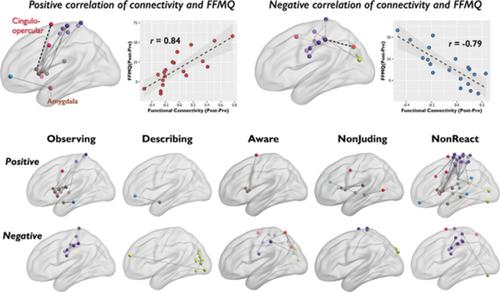当前位置:
X-MOL 学术
›
Hum. Brain Mapp.
›
论文详情
Our official English website, www.x-mol.net, welcomes your
feedback! (Note: you will need to create a separate account there.)
Mindfulness‐based cognitive therapy on bereavement grief: Alterations of resting‐state network connectivity associate with changes of anxiety and mindfulness
Human Brain Mapping ( IF 3.5 ) Pub Date : 2020-10-17 , DOI: 10.1002/hbm.25240 Feng‐Ying Huang, Ai‐Ling Hsu, Yi‐Ping Chao, Chloe Mu‐Hsuan Shang, Jaw‐Shiun Tsai, Changwei W. Wu
Human Brain Mapping ( IF 3.5 ) Pub Date : 2020-10-17 , DOI: 10.1002/hbm.25240 Feng‐Ying Huang, Ai‐Ling Hsu, Yi‐Ping Chao, Chloe Mu‐Hsuan Shang, Jaw‐Shiun Tsai, Changwei W. Wu

|
Bereavement, the experience of losing a loved one, is one of the most catastrophic but inevitable events in life. It causes grief and intense depression‐like sadness. Recent studies have revealed the effectiveness and proficiency of mindfulness‐based cognitive therapy (MBCT) in emotional regulation among bereavement populations. MBCT improves the well‐being of the bereaved by enhancing cognitive performances. Regarding the neural correlates of bereavement grief, previous studies focused on the alleviation of emotion–cognition interferences at specific brain regions. Here, we hypothesized that the bereavement grief fundamentally triggers global alterations in the resting‐state brain networks and part of the internetwork connectivity could be reformed after MBCT intervention. We recruited 19 bereaved individuals who participated the 8‐week MBCT program. We evaluated (a) the large‐scale changes in brain connectivity affected by the MBCT program; as well as (b) the association between connectivity changes and self‐rated questionnaire. First, after MBCT, the bereaved individuals showed the reduction of the internetwork connectivity in the salience, default‐mode and fronto‐parietal networks in the resting state but not under emotional arousal, implying the alleviated attention to spontaneous mind wandering after MBCT. Second, the alterations of functional connectivity between subcortical (e.g., caudate) and cortical networks (e.g., cingulo‐opercular/sensorimotor) were associated with the changes of the mindfulness scale, the anxiety and the emotion regulation ability. In summary, MBCT could enhance spontaneous emotion regulation among the bereaved individuals through the internetwork reorganizations in the resting state.
中文翻译:

基于正念的悲痛认知疗法:静息状态网络连接的改变与焦虑和正念的变化有关
丧亲之痛,失去亲人的经历,是生活中最灾难性但不可避免的事件之一。它会引起悲伤和强烈的抑郁样悲伤。最近的研究揭示了基于正念的认知疗法(MBCT)在丧亲人群情绪调节中的有效性和熟练程度。MBCT 通过提高认知能力来改善丧亲者的幸福感。关于丧亲悲伤的神经相关性,以前的研究集中在减轻特定大脑区域的情绪 - 认知干扰。在这里,我们假设丧亲之痛从根本上触发了静息状态大脑网络的全局变化,并且在 MBCT 干预后,部分网络连接可能会得到改革。我们招募了 19 名参加为期 8 周的 MBCT 项目的丧亲者。我们评估了 (a) 受 MBCT 计划影响的大脑连接的大规模变化;以及(b)连通性变化与自评问卷之间的关联。首先,在 MBCT 之后,失去亲人的个体在静息状态下的显着性、默认模式和额顶叶网络中的网络连接减少,但在情绪唤醒时没有,这意味着 MBCT 后对自发走神的关注有所减轻。其次,皮质下(如尾状核)和皮质网络(如扣带盖/感觉运动)之间功能连接的改变与正念量表、焦虑和情绪调节能力的变化有关。总之,
更新日期:2020-10-17
中文翻译:

基于正念的悲痛认知疗法:静息状态网络连接的改变与焦虑和正念的变化有关
丧亲之痛,失去亲人的经历,是生活中最灾难性但不可避免的事件之一。它会引起悲伤和强烈的抑郁样悲伤。最近的研究揭示了基于正念的认知疗法(MBCT)在丧亲人群情绪调节中的有效性和熟练程度。MBCT 通过提高认知能力来改善丧亲者的幸福感。关于丧亲悲伤的神经相关性,以前的研究集中在减轻特定大脑区域的情绪 - 认知干扰。在这里,我们假设丧亲之痛从根本上触发了静息状态大脑网络的全局变化,并且在 MBCT 干预后,部分网络连接可能会得到改革。我们招募了 19 名参加为期 8 周的 MBCT 项目的丧亲者。我们评估了 (a) 受 MBCT 计划影响的大脑连接的大规模变化;以及(b)连通性变化与自评问卷之间的关联。首先,在 MBCT 之后,失去亲人的个体在静息状态下的显着性、默认模式和额顶叶网络中的网络连接减少,但在情绪唤醒时没有,这意味着 MBCT 后对自发走神的关注有所减轻。其次,皮质下(如尾状核)和皮质网络(如扣带盖/感觉运动)之间功能连接的改变与正念量表、焦虑和情绪调节能力的变化有关。总之,











































 京公网安备 11010802027423号
京公网安备 11010802027423号